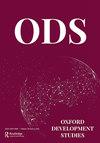非正式产权在城市中的有效性如何?重新审视达累斯萨拉姆非正式性与住房质量之间的关系
IF 1.2
Q3 DEVELOPMENT STUDIES
引用次数: 5
摘要
摘要改善获得适足住房的机会是全球发展的优先事项。基于长期以来对城市非正式安排弱点的看法,产权的形式化在这一议程中发挥着核心作用。然而,在实践中,我们对城市地区的非正规房地产市场是如何运作的知之甚少。根据定量和定性数据,本文表明,达累斯萨拉姆的非正式制度安排在确保所有权和解决交易成本方面——换句话说,在正式化项目所针对的产权的关键方面——出奇地有效。然而,它也表明,该制度在维护财产权的第三个但经常被忽视的组成部分:土地使用权方面是无效的。这导致了一种社会困境,使住房陷入低质量的平衡。这些发现对达累斯萨拉姆和世界各地的政策具有直接影响,并为比较研究开辟了新的途径。本文章由计算机程序翻译,如有差异,请以英文原文为准。
How effective are informal property rights in cities? Reexamining the relationship between informality and housing quality in Dar es Salaam
ABSTRACT Improving access to adequate housing is a global development priority. Formalisation of property rights occupies a central role in this agenda, based on long-held ideas about the weaknesses of informal arrangements in cities. In practice, however, we know remarkably little about how informal property markets in urban areas work. Drawing on both quantitative and qualitative data, this paper demonstrates that informal institutional arrangements in Dar es Salaam are surprisingly effective in securing ownership and addressing transaction costs – in other words, in the key dimensions of property rights targeted by formalisation projects. It also reveals, however, that the system is ineffective at upholding the third yet often-overlooked component of property rights: land use rights. This results in a social dilemma that traps housing in a low-quality equilibrium. The findings have direct implications for policy in Dar es Salaam and across the world and open new avenues for comparative research.
求助全文
通过发布文献求助,成功后即可免费获取论文全文。
去求助
来源期刊

Oxford Development Studies
DEVELOPMENT STUDIES-
CiteScore
2.70
自引率
0.00%
发文量
20
期刊介绍:
Oxford Development Studies is a multidisciplinary academic journal aimed at the student, research and policy-making community, which provides a forum for rigorous and critical analysis of conventional theories and policy issues in all aspects of development, and aims to contribute to new approaches. It covers a number of disciplines related to development, including economics, history, politics, anthropology and sociology, and will publish quantitative papers as well as surveys of literature.
 求助内容:
求助内容: 应助结果提醒方式:
应助结果提醒方式:


